Kenya accused of forest evictions for green paymentspublished at 10:41 GMT 9 November 2023
Leaders of the Ogiek community say armed forest rangers are "pulling down houses with axes and hammers".
Read MoreLeaders of the Ogiek community say armed forest rangers are "pulling down houses with axes and hammers".
Read MoreSpeaking for the first time, Kar Hao Teoh's family tells how he was shot dead in South Africa.
Read MoreBritish surgeon Kar Hao Teoh was killed in front of his mother, wife and young son in South Africa.
Read MoreA pathologist says John and Susan Cooper died of carbon monoxide poisoning, inquest hears.
Read MoreTwo men say Egypt sent them back to a warzone after they waited for days at the Rafah crossing.
Read MoreLalibela is home to famous 13th Century churches that are registered as Unesco world heritage sites.
Read MoreWe'll be back on Friday
That's it for now from the BBC Africa Live team. We'll be back on Friday morning.
Until then, there will be an automated feed here.
Or you can find the latest updates on the BBC News website, or listen to our Focus on Africa podcast.
A reminder of our wise words of the day:
Quote MessageOne's propensity to watch fights will lead him to start fighting."
A Bemba proverb sent by Chishimba Milongo in Chongwe, Zambia
Click here to send us your African proverbs.
We leave you with a photo of a boy being helped out of a rickshaw taxi as heavy rains pound Somalia's capital, Mogadishu:
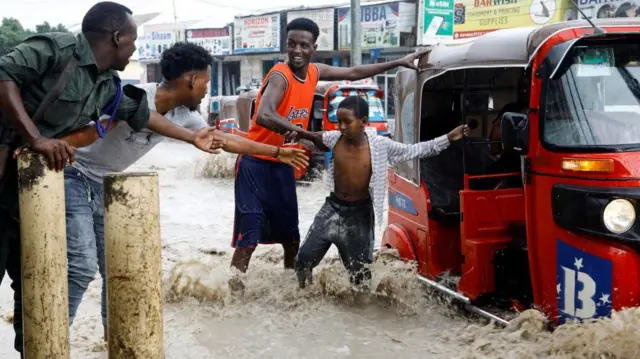 Image source, Reuters
Image source, ReutersThe former head of Togo's army and four other soldiers have been given prison sentences over the murder of a high-ranking colonel, the AFP news agency reports.
A military court sentenced the soldiers to between five and 20 years over the murder of Lt-Col Bitala Madjoulba.
He commanded Togo's elite 1st Rapid Intervention Battalion, and was found dead in his office at a military base on 4 May 2020, a day after President Faure Gnassingbé was sworn in for a fourth term, AFP reports.
Marco Oriunto
BBC News
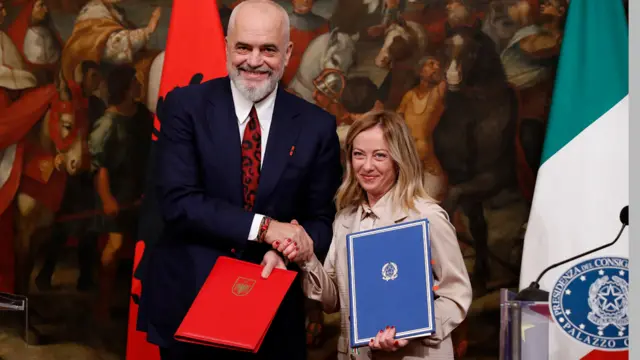 Image source, Getty Images
Image source, Getty ImagesItalian PM Giorgia Meloni and her Albanian counterpart Edi Rama announced the deal on Monday
Italy’s plan to detain migrants who make the dangerous crossing over the Mediterranean from Africa in Albania has received a mixed reaction.
On Monday, Italian Prime Minister Giorgia Meloni and her Albanian counterpart Edi Rama said that two migrant centres would be built in two towns on Albania’s north-western coast.
Together the centres will host up to 3,000 people as the Italian government attempts to outsource the processing of some migrants.
Because Albania is not part of the European Union, the centres will allow Italy to avoid rules dictated by the Dublin Regulation that stipulates refugees seek asylum in the first EU country they enter.
This year alone 145,000 people have arrived in Italy mostly from Guinea, Ivory Coast and Tunisia, UN figures show, external.
Ms Meloni said children, pregnant women and “other vulnerable subjects” would not be sent to Albania, specifying that the purpose of the agreement is was to “prevent illegal migration and welcome only those who have the right to international protection”.
But the plan has been criticised by Amnesty International, which said the plan was “illegal and unworkable”, adding that it should be scrapped, external.
A member of Italy’s left-leaning Piu’ Europa party, Riccardo Magi, branded the plan “an Italian Guantanamo”., external
Residents of Shengjin, one of the Albanian towns that is to host a centre, expressed their concerns, telling online news outlet Euractiv that said they feared “tourism would be destroyed”, external.
Other residents were more positive, seeing it as a way to thank Italy for helping their families in the 1990s – a reference to the mass-migration of Albanian nationals to Italy after the fall of the communist regime in 1991.
Italy has previously explored the offshoring of asylum seekers – reportedly with Morocco, Egypt and Tunisia, external.
In September, the country passed measures that give the authorities the power to detain migrants for as long as 18 months, external while their applications are considered.
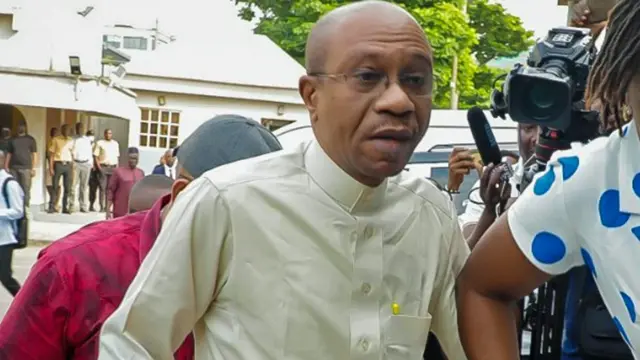 Image source, Mansur Ibrahim
Image source, Mansur IbrahimGodwin Emefiele has been ordered to surrender his passport
A court in Nigeria has ordered the release of former central bank governor Godwin Emefiele, who has been in detention since June, on bail.
"There must be an end to detention without trial," said Judge Olukayode Adeniyi, sitting in the High Court in the capital, Abuja.
Mr Emefiele has been charged with illegally owning a shotgun after he was arrested by the feared secret police, officially known as the Department of State Services (DSS).
He denies the charges.
However, his trial has stalled since August when the security agencies failed to present him in court to enter a plea, Reuters news agency reports.
Mr Emefiele was granted bail on condition that he surrenders his passport and his lawyers produce him in court on 15 November. He was not asked to put up any money as a condition for bail.
Read more: How central bank governor ended up in court
A woman has been gunned down outside a court in South Africa, just moments before she was due to give evidence against police officers on trial for torture, the local News24 website reports, external.
A car pulled up as she was approaching the court before she was shot dead - along with a man who was also a state witness in the case, the newspaper reports.
A police spokesman is quoted as saying that the motive for the murders is still unknown.
Kalkidan Yibeltal
BBC News, Addis Ababa
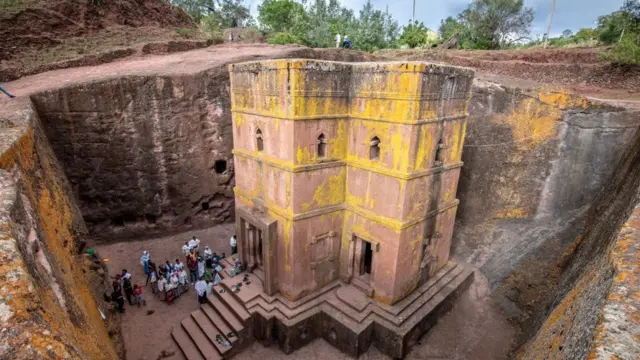 Image source, Getty Images
Image source, Getty ImagesLalibela is famous for its rock-hewn churches
Ethiopian government forces and local militias have clashed in the historic town of Lalibela in the volatile Amhara region, residents have told the BBC.
They described the fighting as intense and said it included the use of heavy weapons.
A plane due to land at the airport on Wednesday morning failed to do so, the residents said.
Lalibela is home to rock-hewn churches built in the 13th Century and is registered as Unesco world heritage site, making it a popular tourist destination.
In August, militias briefly took control of the town’s airport.
The BBC’s attempts to reach Amhara officials have not been successful, and the government has not issued any statement.
Witnesses accused the paramilitary group Rapid Support Forces (RSF) of targeting and killing non-Arabs.
Read More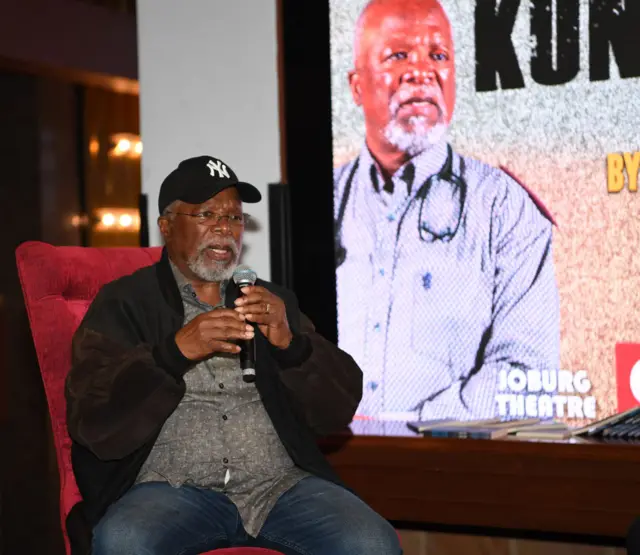 Image source, Getty Images
Image source, Getty ImagesJohn Kani says he is "deeply moved" by the award
One of South Africa's most celebrated artists, John Kani, has been awarded an OBE - Order of British Empire - by King Charles.
Making the announcement, the British High Commissioner in Pretoria, Antony Phillipson, said the honour was "extremely well-deserved".
“For almost 60 years he has been one of South Africa’s most renowned actors, authors, directors and playwrights," Mr Phillipson said.
"From playing T’Chaka in Black Panther, to his wonderful Kunene and the King, which I was privileged to see him perform in a few months ago in Pretoria, he has performed around the world on stage and on screen, inspiring and empowering millions through his accomplishments,” he added.
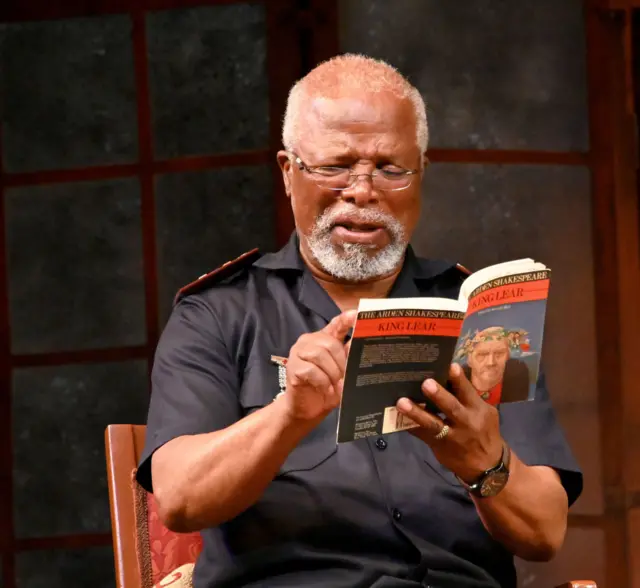 Image source, Getty Images
Image source, Getty ImagesJohn Kani at the premiere of Kunene and The King at a theatre in South Africa in 2022
Kani said he was "deeply moved" by the honour.
"I have always been amazed and delighted by how my work has been received by critics and audiences," he added.
The UK government says the honours system recognises exceptional achievement and service, and includes non-British nationals who receive “honorary” awards from the monarch on the advice of its Foreign, Commonwealth, and Development Office.
 Ameyu Etana
Ameyu Etana
BBC Afaan Oromoo
Much-awaited talks between the Ethiopian government and the Oromo Liberation Front (OLA) rebel group have resumed in Tanzania, diplomatic sources have told BBC Afaan Oromoo.
Significantly, OLA commander Kumsa Diriba has joined Ethiopian government and military officials in the talks for the time, the sources added.
A previous round of talks between the OLA and the government ended without agreement, and fighting continued.
The regional bloc, Igad, which is headed by Ethiopia’s former Minister of Foreign Affairs Workneh Gebeyehu is believed to be among key mediators.
Both the Ethiopian military and the OLA - which advocates "self-determination" for the vast Oromia region - have long been accused of gross human rights violations, which they always deny.
Human rights groups say the conflict in Oromia is ‘’hidden’’ from the international community, and urge the international community to step in to help end what they call Ethiopia's "forgotten’’ conflict.
Read: Ethiopia’s PM sees OLA rebellion grow in his own backyard
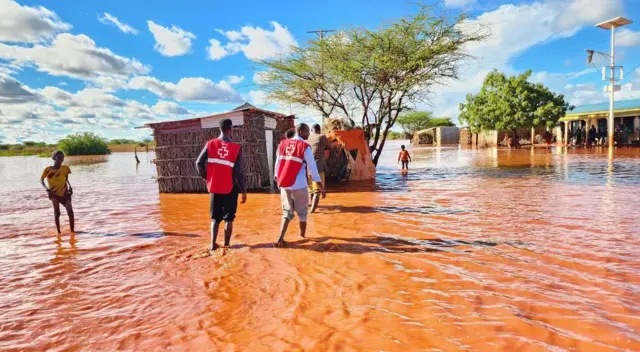 Image source, Jagan Chapagain/X
Image source, Jagan Chapagain/XMany villages iin northern Kenya have been inundated
The Kenya Red Cross has called for “emergency action” amid intensifying rains and floods that have so far killed at least 15 people and displaced more than 85,000 households in the East African state.
The World Meteorological Organisation said that El Niño, the phenomenon behind the heavy rains, was likely to persist at least until April 2024.
The Kenya Red Cross said that the counties of Garissa, Tana River and Kilifi were at risk of flooding as the heavy rains push water in the Tana River beyond “critical levels”.
In the neighbouring Mandera county, the town of Elwak town has been entirely submerged.
“The humanitarian situation is dire. Thousands are in need of life-saving interventions in food, water and access to health care. We must mobilise urgently and to the right scale,” Kenya Red Cross CEO Ahmed Idris said.
Heavy rains have swept through East Africa in recent days, leading to flooding in parts of Kenya, Somalia and Ethiopia.
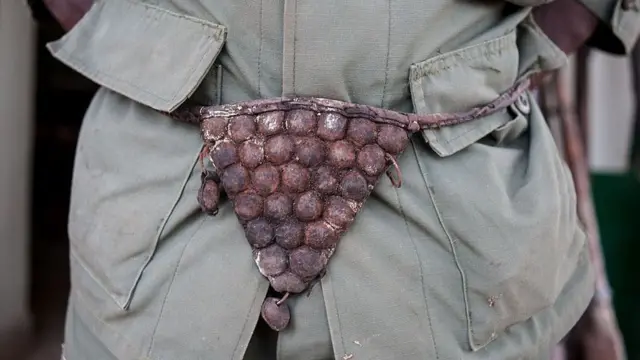 Image source, Getty Images
Image source, Getty ImagesSome people in Nigeria believe charms protect them
A man has been shot dead in Nigeria's north-eastern Bauchi state while a so-called bullet-proof charm - or "gun medicine" - was being tested on him by a traditional healer, police spokesman Ahmed Wakil has said.
The healer - who allegedly fired the shot with a locally made gun - has been arrested, along with two other suspects, while other suspects are on the run, he added.
The test on the efficacy of the "gun medicine" occurred on 43-year-old villager Muhammadu Ali, Supt Wakil said.
Police rushed to the scene as soon as they heard of the shooting, and took Mr Ali to hospital, but he was pronounced dead on arrival, the police spokesman added.
He warned the public against being used as "cannon fodder".
The suspects would be charged to court after investigations were concluded, Supt Wakil said.
Charms believed to have magical powers are commonly used in Nigeria, where many people consult traditional healers over a wide variety of issues.
But there have been several reports of people being killed after testing so-called bullet-proof charms and medicines.
 Lion Tsigab
Lion Tsigab
BBC Tigrinya
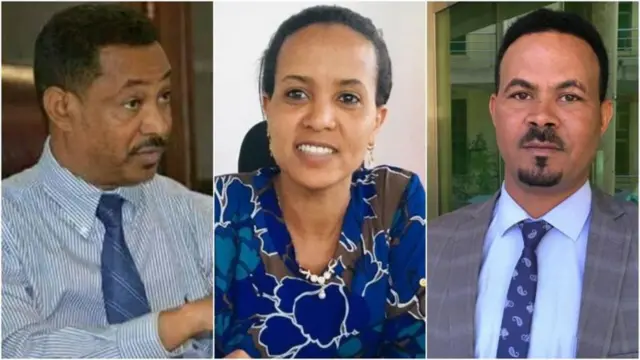
Those fired - Alem Gebrewahid (L), Liya Kassa (C) and Amanuel Assefa (R) pictured here - are also senior TPLF members
The interim leader of Ethiopia’s northern region of Tigray, Getachew Reda, has taken the unprecedented move of sacking four senior officials.
They are also key members of the Tigray People’s Liberation Front (TPLF), the party which agreed to a peace pact with government last November after a brutal two-year civil war.
He gave no reason for firing his deputy Alem Gebrewahid, who is also the TPLF’s chairperson, Amanuel Assefa, the chief cabinet secretary, Liya Kassa, the South Eastern Zone administrator and Teklay Gebremedhin, who headed the North Western Zone.
But the move has caused shockwaves in the region, especially within the TPLF.
It also comes a week after the region marked the one-year anniversary of the peace deal that established the interim administration, which has faced criticism for not doing more to help those affected by the war.
Millions of people are still living in displacement centres in a dire situation and with there is anger that armed groups from the Amhara region and Eritrean troops are still in Tigray.
Last month, Mr Getachew complained that zonal administrators were working to undermine his administration.
The TPLF, which has dominated the region for nearly half a century, has not yet responded to the sackings.
The UK project to set a new land speed record will try to get back on the road with a new driver.
Read MoreMakuochi Okafor
BBC News, Accra
A major renal unit at Ghana's publicly funded Korle-Bu Teaching Hospital (KBTH) in the capital, Accra, has reopened after a five-month closure.
The country’s largest treatment centre for patients suffering kidney disease shut because of budgetary issues and it was unable to pay for the everyday needs of those needing its services.
This week, the hospital management announced that it was in collaboration with the Ministry of Health, external to resolve debt resulting from cost under-recoveries.
“The Ministry of Health is working closely with the management of KBTH to offset the 4m Ghanaian cedis ($335,860/£273,610) debt, occasioned by the cost under recoveries,” the statement read.
Last week, Ghanaian MPs summoned Health Minister Kwaku Agyeman Manu about the unit's closure
According to Kofi Baffour Ahenkorah, the head of a patients' group, 19 people have lost their lives since the facility closed.
Many patients who could not afford treatment at private hospitals were left without options during the closure.
Patients in need of dialysis treatment typically have to visit the hospital three times a week.
The cost of treatment at KBTH was $190 (£160) per week, considerably lower than private hospitals' rates.